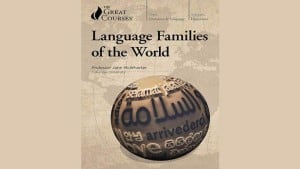Linguistic Time Capsules: The Language Families of the World Audiobook
As the sun dipped below the horizon, painting the sky with strokes of orange and pink, I settled into my favorite armchair – a cozy sanctuary for my nightly ritual. Tonight’s companion was not a person but a journey through sound, an exploration narrated by none other than John McWhorter himself. With eager anticipation, I pressed play on The Language Families of the World Audiobook, ready to be whisked away on an auditory voyage through history and across continents.
John McWhorter’s voice filled the room, a familiar presence that brought an immediate smile to my face. As both author and narrator, McWhorter had a knack for infusing life into linguistics – a subject that might seem dry to some but was music to my ears. His tone danced between scholarly and conversational as he began unraveling the tapestry of human language, guiding me through its intricate patterns with the ease of a seasoned storyteller.
This audiobook was not merely a recitation of facts; it was a narrative spun from the threads of human connection, an ode to our shared heritage. McWhorter masterfully conveyed linguistic nuances with such passion that each phoneme and syntax felt like characters in their own epic saga. He navigated through 34 lectures with finesse, each one shedding light on different language families – their origins, evolutions, and idiosyncrasies.
I found myself utterly captivated by how ancient languages whispered secrets about our ancestors’ lives – how they loved, fought, traded, and dreamed. It was like listening to echoes from millennia past, piecing together puzzles that formed our current linguistic landscape. There were moments when I paused the audiobook just to let certain revelations sink in; times when extinct languages seemed less like relics and more like bridges connecting me to bygone eras.
The brilliance of McWhorter’s storytelling lay in his ability to make linguistics accessible without sacrificing depth. Each lecture felt like peeling back layers of history to reveal how language shapes identity and culture. The diversity he described wasn’t simply academic – it was a celebration of humanity’s vast tapestry woven from words.
It struck me how language could be both permanent and ephemeral – enduring yet susceptible to time’s relentless march. Languages once spoken across empires now lay silent except in texts or as faint imprints on their descendants. Yet here I was in my living room – a modern-day listener – connecting with those long-lost voices thanks to this audiobook.
As someone who once dabbled in writing mysteries where words were clues leading protagonists down shadowy paths towards truth, this deep dive into linguistics felt familiar yet thrillingly new. The mystery wasn’t fictional; it was real – a puzzle spanning generations waiting for curious minds like mine (and perhaps yours) to solve.
For fellow enthusiasts yearning for more after this linguistic odyssey ends, I’d recommend delving into McWhorter’s other works such as Myths, Lies and Half-Truths of Language Usage and The Story of Human Language. Each offers its own unique treasure trove of insights worthy of any bibliophile or audiophile’s collection.
And if your curiosity is piqued enough to embark on this journey yourself – I bring good tidings! The Language Families of the World Audiobook free listening experience is available at Audiobooks4soul.com – a haven for those who seek knowledge through the spoken word.
Reflecting upon this auditory adventure leaves me grateful for authors like McWhorter who can transform complex subjects into compelling narratives that resonate beyond academia’s walls into our daily lives – reminding us that every word we speak is part of a larger story stretching back through time.
Eagerly awaiting our next narrative adventure together – with headphones at the ready – I sign off with heartfelt appreciation for stories told not just through ink but also through sound waves weaving histories into present understandings.
Happy listening,
Stephen











